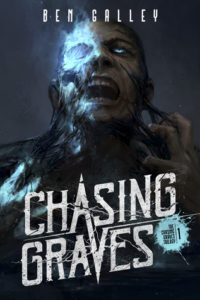
Not gonna lie, the cover and the glowing reviews from grimdark aficionados put me off trying out Chasing Graves for quite a while—bleak and shocking isn’t really my game. But I had four days left on a Kindle Unlimited subscription, and of the KU books on my radar, it had the most gripping opening, so I gave it a try, and let me tell you, it was well worth it.
Chasing Graves was a semi-finalist in the 2019 Self-Published Fantasy Blog-Off, getting edged out by eventual winner (and my current favorite self-published work) The Sword of Kaigen, and Ben Galley’s work joins an auspicious list of self-published titles that failed to make the SPFBO finals (a list headlined by the no-longer-self-published Senlin Ascends). This one opens a trilogy, and it definitely reads more like opener of a longer work and not a complete story—don’t expect resolution from Chasing Graves.
But you can expect a compelling protagonist never short on snark, a fresh and creative world, and the beginning threads of a plot that will turn that world upside down. Chasing Graves takes place in Araxes, an enormous, Egypt-inspired city resting on the small habitable strip between desert and sea, and a land whose people have learned how to bind the dead to prevent them crossing into the underworld. This renders unnecessary the choice between killing and enslaving—the rich of Araxes can do both!
There are several perspective characters here, but only one first-person perspective, from a thief who finds himself murdered and sold into slavery as a shade. Caltro Basalt is far from kind or selfless, but his snarkiness and dogged refusal to accept his captivity make his chapters utterly riveting and difficult to put down. There are also a handful of other perspective characters in various positions in Araxes. Their storylines don’t all connect in the first book, but they serve to broaden the reader’s understanding of both the setting and the forces at work behind the main plot—there’s only so much you can learn when your perspective is limited to a single enslaved ghost. There is one final perspective character, prominent enough to be a co-protagonist despite being written in third-person, whose story is farther removed from the others. She begins deep in the desert, facing a perilous journey to reach the city before either succumbing to the elements or losing her chance to bind the shade of the man she murdered. For most of the book, her storyline remains a little disconnected, and isn’t quite as compelling to me. Then again, desert survival stories aren’t my preference, and there’s plenty of drama in her storyline. I imagine that this perspective will work for plenty of readers.
Chasing Graves hints pretty early at a plot that will strike at the heart of the system of enslaving ghosts, but this installment doesn’t progress far in that direction. It’s a lot of setup, and it won’t satisfy readers who want a book with complete story arcs. That said, Galley builds a fascinating world, the plot hints are interesting enough, and Caltro has such a strong and compelling voice that I enjoyed this one even without a resolution—being a quick read didn’t hurt either.
There was one piece of the worldbuilding that jarred me a bit—the first chapter describes factories and smokestacks that suggest Araxes is entering an Industrial Age, but a side character later talks of science as if it’s totally unknown apart from a few eccentrics. Perhaps this is addressed later in the trilogy, but I suspect a continuity error that doesn’t affect the main plot but threw off my mental picture. But if it is a continuity error, it’s the only error I spotted—Chasing Graves is remarkably polished, with easily flowing prose and such a clean copy that I checked at least once to make sure it hadn’t been picked up by a traditional publishing house. Self-published books aren’t always well-edited, but this one is as professional as they come.
While not short on the colorful language, this is a book that keeps the tone lighter than the subject matter dictates, eschewing both the bleakness and objectification of women that I worry about in a story heavily featuring murder, slavery, and the undead. It delivers a fascinating world, a fantastic protagonist, interesting secondary characters, and clean, smooth prose. The mostly-disconnected desert storyline and the lack of even intermediate plot resolution hold me back from giving it five stars, but the strong foundation and the incipient convergence of storylines near the end have me very excited for the sequel (which was released in 2019–I just haven’t read it yet). I wouldn’t be at all surprised to see this series become one of my favorites by the time it’s done.
Recommended if you like: sarcastic, self-centered protagonists, creative worldbuilding, Egypt-inspired fantasy.
Overall rating: 16 of Tar Vol’s 20. Four stars on Goodreads.
